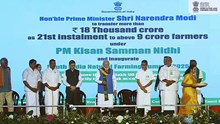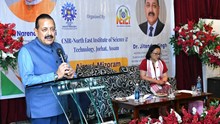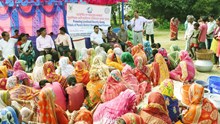
The Division of Agricultural Engineering, ICAR was established in the year 1945. The mandates of the division are: conducting strategic research on design and development of technologies & equipment in the areas of Farm Machinery & Power, Agricultural Processing and Structures and food engineering, Protected Cultivation, Soil and Water Engineering and Renewable Energy Sources with extension of technologies to farmers and entrepreneurs. The mandate of the division has further been expanded recently to include conducting basic and applied research in food science and technology and food safety related areas.
Presently, Dr. K. Alagusundaram is the Deputy Director General of the Agricultural Engineering Division and very well known for his achievements in the areas of food and crop processing technology. Prior to joining as DDG (AE), he served as the Director of Indian Institute of Crop Processing Technology (Ministry of Food Processing Industries) which is located at Thanjavur, Tamil Nadu. Dr. K. Alagusundaram obtained his undergraduate Agricultural Engineering degree from Tamil Nadu Agricultural University. He obtained one of his Master degree in Farm Power and Machinery from the Asian Institute of Technology, Thailand, and another one in food technologies from the University of Manitoba, Canada. He earned his Doctorate degree in Food Process Engineering from the University of Manitoba, Canada. His main focus of work will be creating, at several places in the country, NABL accredited Food Testing Laboratory, ISOcertified Food Processing Training cum Business Incubation Centers and world class research laboratories for research in farm mechanization, food processing, renewable energy use in agriculture and soil and water conservation engineering.
In an interview with Agriculture World, Dr. Alagusundaram discussed upon key working areas of engineering division, status of mechanization in India and significance of value addition in crop produce. Here are the excerpts of the discussion:
Agriculture Engineering Division of ICAR is strategic research body established for designing and development of technologies &equipment. How is this division functioning across India?
The Agriculture engineering division is functioning as an apex body, undertakes basic, applied and adaptive research leading to development and improvement of equipment, technology, process for crop production, postharvest technology &food processing, energy-use in agriculture and rural industries and irrigation & drainage. We provide lead a huge team of researchers across the country which include 6 R&D institutes directly uner the administrative control of the division, 6 All India Coordinated Research Projects (shortly called as AICRPs)and 2 Network Projects all over India.Recently 5 Consortia Research Platforms (shortly called as CRPs) were also initiated. With the help of this huge network we plan, coordinate and monitor R&D Programs and serve as an information storehouse in Agricultural Engineering.
The 6 Research Institutes functioning under the division are:
- Central Institute of Agricultural Engineering (CIAE), Bhopal,
- Central Institute on Post-Harvest Engineering and Technology (CIPHET), Ludhiana
- Central Institute of Research on Cotton Technology (CIRCOT), Mumbai,
- National Institute of Research on Jute & Allied Fiber Technology (NIRJAFT), Kolkata,
- Indian Institute of Natural Resins and Gums (IINRG), Ranchi and
- Indian Agricultural Statistics Research Institute (IASRI), New Delhi.
The 6 All India Coordinated Research Projects are:
- Post-Harvest Engineering and Technology
- Farm Implements & Machinery,
- Plasticulture Engineering and Technology
- Energy in Agriculture and Agro Based Industry
- Ergonomics and Safety in Agriculture, and
- Utilization of Animal Energy
The five newly launched Consortia Research Platforms are:
- Secondary Agriculture
- Health Foods
- Energy from Agriculture
- Far Mechanization and Precision Farming
- Natural Fibres
The two Net Work Projects are:
- Harvest, Processing and Value Addition of Natural Resins and Gums
- Conservation of Lac Insect Genetic Resources
These institutes, AICRPs, CRPs and Net Work projects are spread across the country in more than 120 locations. Our main mission is to develop and introduce need-based and region-specific engineering technologies to achieve sustainable enhanced productivity and profitability of different farming systems. Farmer are the important clientele for us and we create technologies suitable to small and medium farm holders. We offer numerous hands on training programs to producers in our institutes and through our AICRPs, CRPs and Net Work projects.
What is current scenario of farm mechanization in India?
Farm mechanization in India is still in its early stages. In the global scenario India is still lower than United States, Western Europe, Russia, Brazil and China. India stands on the 8th position at the international level. During last two decades, we have achieved just 5 % growth. The average farm machinery availability is still very low in the country compared to our neighbor country, China.
Increasing costs and shrinking populations of farm labourers make farming in India less remunerative. The shortage of labourers during peak seasons of harvest, sowing and land preparation causes farming operations untimely leading to lower yields and crop losses. It is also imperative that primary and secondary processing operations need to be done by the producers and on the farm sites. Mechanization of such post-harvest unit operations for numerous crops need to introduced in our farms to make the farming profitable. For the staple crops like wheat and rice, harvesting and threshing operations have been mechanized to the level of 60-70 %, while for other crops the mechanization level is less than 5 %.
Farm mechanization has become a dire necessity in view of significant reduction in supply of labor for agricultural operations during peak seasons. The agricultural operations like seeding, crop care and harvesting of cereals and horticultural crops are on top priority for the farmers. But mechanization of these operations is still not up to the level of farmers’ expectations. Farmers need complete mechanization package for major crops. The benefit of hi-tech, affordable and hi-productive agricultural machinery should be passed to farmers through creation of hubs for such farm equipment.
It does not necessarily mean we do not have such technologies. The continuous research efforts over several decades by our scientists in our own institutes and the AICRP centers in State Agricultural Universities have resulted numerous technologies that are suitable to Indian farmers. These need to be taken to the farmer in a way he understands the benefit of using such machinery for farming and post-harvest operations. Our division proposes to take up the activity of popularizing our technologies on a Mission Mode so the benefit our research reaches the farmer in meaningful ways.
Although India is agricultural country but its farm holding is mostly small so how can a small farmer afford the expense of costly farm machinery?
First thing, I want to say small holding is not an issue in adopting the machinery for farming and post-harvest operations. The focus of our research efforts is mainly on creating useful technologies for small to medium farm holders. Usefulness of a machinery in small farms, affordability by small farmers, timeliness of operations and sustainability of such technology over long periods of time are the major common base on which we conduct research. Of course, we have not ignored large farms, in several of our centers research also focuses on inventing new technologies for large farms too.
Generally, awareness about the farm machinery is very little and we need to make farmers know of the developments in farm mechanization and post-harvest processing. In many instances, when farmers are unable to purchase and use some of these machinery due to prohibitive costs, we may support it by allowing them to rent the machinery through co-operative machinery hiring centers.
Apart from this, the Government has launched a major program called" Sub-mission on Agricultural Mechanization (SMAM)" to promote the usage of farm machines and increase the farm power availability up to 2.0 kW/ha. The major objectives of this Mission are to increase the reach of farm mechanization to small and marginal farmers and to the regions where availability of farm power is low and to create awareness among stakeholders through demonstration and capacity building activities. In order to offset the adverse economics of scale arising due to small land holdings and high cost of individual ownership, the mission also aims to promote custom hiring centers and high-tech hubs and high value farm equipment.
The farmers economic status can be improved upon only if he value adds his crop and brings to market than selling it raw. During harvest seasons due to glut in the market, often, there are no buyers for the produce and the farmers are forced to sell them at low-low prices or throw them on the streets. Value addition does not mean huge investments. Small and marginal farmers can easily afford to have small primary processing centers and rural pack houses so they can value add and sell at a good margin of profit. Our institutes and AICRP centers work towards identifying technologies for post-harvest primary and secondary processing that are of low cost and can easily be replicated by producers.
We are giving a complete solution of mechanization and food processingat different stages from seed sowing to marketing of produce through our 'Capacity Building and Incubation Program' which aims at entrepreneurship and enterprise development across India. Food processing training cum incubation center needs to be created at numerous places in the country so the producers, their women and rural youth are offered hands on training on processing and value addition. This will help in new cottage level food processing business ventures in rural areas. Such ventures by farmers will have multivariate benefits such as:
- The farmer will get a better return from his produce which is value added
- The post-harvest loss due to poor handling and transportation will get eliminated to greater food products will be available for marketing locally and internationally
- This is a wonderful way of creating greater employment opportunities in rural India
Currently we are working on creating food processing training cum incubation centers in five different places in the country. If funds become available these must be replicated at the rate of a minimum of one in each State to begin with.
What is scope of food processing in India? What initiatives have been taken by government for its promotion?
Processed food will play a major role in future and soon "Kitchen-less homes" are going to be a reality. India has to see the creation of as many food processing industries in rural India so a minimum of 50% of our producer are processed and value added on the farm sites. In addition to the rural food processing industries, large scale urban food industries should also come into play. These large scale urban industries may take the minimally processed foods from rural industries as their raw material for further processing. Several Mega Food Parks are coming up in the country. New ventures on medium to large scale food processing can be initiated in these mega food parks.
To meet the national and international safety standards our food industries must adopt to good manufacturing practices including proper implementation of HACCP rules. The safety and quality of the processed and raw foods need to be tested periodically and labelled appropriately for the buyer to examine. Food quality testing laboratories need also to be established at many places in the country to help the newly coming up food industries.
Our Division, using the financial support from the Ministry of Food Processing Industries, Government of India, offers supports for creating food quality testing laboratories. For new food quality testing laboratories or for expansion of existing one the project offers up to 50% of costs on equipment and up to 35% of cost on infrastructure.
There is a need to set up food processing units in villages as only 2.2 per cent farmers are beneficiaries of such activities. This should be increased to more than 6 per cent to generate 4.21 lakh jobs for rural youth. Due to the research efforts of ICAR and State Agricultural Universities we have achieved a tremendous growth in food production. Now is the time we focus on reducing our post-harvest losses, value add our farm produce, make the farmer get greater income and make more food available for consumption.














Share your comments